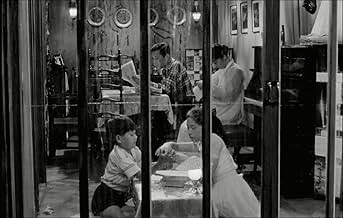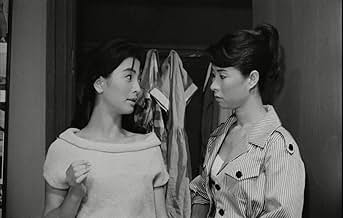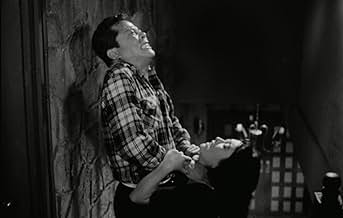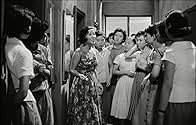NOTE IMDb
7,2/10
6,3 k
MA NOTE
Un compositeur et sa femme sont emportés dans la tourmente lorsqu'une servante affiche un comportement inattendu.Un compositeur et sa femme sont emportés dans la tourmente lorsqu'une servante affiche un comportement inattendu.Un compositeur et sa femme sont emportés dans la tourmente lorsqu'une servante affiche un comportement inattendu.
Kim Jin-kyu
- Dong-sik Kim
- (as Jin Kyu Kim)
Ahn Sung-ki
- Chang-soon Kim
- (as Sung-kee Ahn)
Avis à la une
Allow me to add to the hype: this film is as delirious as they come. Starting out as a typical realist glance into 1960's South Korea as centered on a upwardly-mobile family, after the plot gets settled, becomes a hysterical and expressionistic tale of corrosive sin and deception. The transformation of one night's flirtation into a grandiose moral eradication is the one of the most stunning turns of atmosphere I've ever seen in a film. Also amazing is how your view of the characters changes dramatically as they are faced with this living hell. While researching about the director, I found out that the actress who played the housemaid, Eun-shim Lee, fulfilled the part so well that she couldn't find work after this movie. Audience members were literally screaming for her death at the original showings! See this film just for her, you won't regret it! I can't say enough great things about the director Kim Ki-young, too bad most of his films aren't available in English!
Not a perfect film, but certainly an intriguing and timely one, coming out at a time when films around the world were breaking boundaries and pushing their subject matter to the next level - think PSYCHO and PEEPING TOM, for instance. This distinctly Korean movie takes a look at issues involving class, gender roles, family dynamics and social norms, all set in a middle class household where the arrival of the titular character explodes tensions and invokes horror all round. Well shot and very well acted, this is occasionally dated and melodramatic, a little slow at times, with an ending that doesn't quite work, but otherwise it's well worth a look.
Ki-young Kim's "The Housemaid" proved an interesting viewing experience for me, in that it ultimately differed very much from what I had come to expect about a half hour into the film. What we appear to have here is another film like Joseph Losey's "The Servant", which was a left-wing, revolutionary exercise in which a lower class man enters an upper class household as a servant, and ultimately takes over the bourgeois home, throwing it into upheaval and chaos. Likewise, in "The Housemaid", a young woman joins a wealthier household as a maid, and instantly things begin to take a turn toward disorder and familial disintegration. It could easily be a revolutionary, communist film like Losey's. It is not.
In fact, it is the polar opposite. It turns out that "The Housemaid" is actually an overtly conservative film. This film is undebatably a defense of traditional family values like faithfulness, fidelity, and monogamy. Another film with a virtually identical plot could have just as easily been an attack on those same values. In "The Housemaid", however, the character of the maid is not the instrument of revolution, the hand of Marxist justice that has come to wipe out every trace of bourgeois society from our microcosmic household (e.g. Dirk Bogarde's character in "The Servant"); rather, she is the face of temptation, the tantalizer that will be the destruction of a healthy, happy family, should the patriarchal figure fall into that inescapable abyss of adultery.
Some viewers have interpreted the film in other ways, though I don't see how they could. This isn't that kind of film. There really isn't anything ambiguous here. The only exception — the one place where interpretation of the film's message might become a bit convoluted — is the framing device that Kim uses at the film's bookends. I would note the likelihood that this was added for the sake of the censors. After all, it is somewhat surprising that Kim got this film passed in the first place, and the frame story, which abruptly obliterates the reality of the film's central storyline, may have been the only reason he was able to do so. Despite my usual partiality for any kind of narrative complexity or nonlinear structure, I felt this device was mildly detrimental to the film's integrity. Regardless, it really doesn't change anything about the nature of the film's message.
Thematically, the key moment in the film comes fairly early on, immediately after the decisive act of infidelity. Kim goes to great lengths to underline this instant as the pivotal moment in the lives of his characters, a moment from which there will be no return. He achieves this rather heavy-handedly, by cutting away from the room in which the action occurs, to a shot of a large tree standing outside the house, which is immediately struck by lightning, as if to make it abundantly clear, written in Fuller-esque boldface type: This is the moment that changes everything! This is the undoing of a family!
It's not a subtle film, needless to say. There are, however, master touches throughout. The cinematography is certainly impressive, as is Kim's direction. The laterally panning shots through the plate glass on the upper floor of the house are fantastic. It is quite a well shot film, and Kim works inspiringly within the limited space of only a few settings.
Dramatically, however, "The Housemaid" was somewhat disappointing. The film can't decide whether it wants to be a Buñuelian art film or a Hitchcockian thriller, and the resulting blend is very uneven, increasingly as the film progresses. Kim never gives this film any real, constant identity. The score was quite poor. With its obtrusive and highly transparent attempts at creating tension and coercing the viewer into a certain emotion, it never ceased to intrude on the viewing experience.
This may be a political film — it certainly has a plainly conservative message — but if it is, it's not because Kim intended it to be. Despite being pressured by his government to foray into political filmmaking on a few occasions, Kim himself was not particularly interested in politics. He once said, "North or south, capitalist or communist, ideology is far less interesting to me than the things that divide the sexes."
Indeed, this is evident in "The Housemaid". Kim is clearly much more interested in the boundaries and barriers between men and women — the impediments that obstruct the path to intimacy and healthy relationships — than he is in any specific political ideology. And this is where the film regains some of its composure. Comparisons have been made to the work of Luis Buñuel and Shôhei Imamura. I can see it, in terms of its portrayal of passion and conflicted attempts at intimacy between the sexes, but on the whole I think those are pretty loose comparisons. "The Housemaid" works best as a psychological drama. When we analyze the motives of the characters, and what drives each of them toward their respective actions, the film comes into focus fairly nicely. When it tries to move into suspense, however, it looses its momentum as a drama, and as a successful, cohesive work of cinema.
All things considered, I think this is a good film. I can't call it a masterpiece, or even a great film, although I know many feel that way about it, but I do think it's quality cinema that's worth seeing. My biggest complaint with the film is its extreme lack of subtlety, in multiple facets of the art of filmmaking. Dramatically, "The Housemaid" goes way over the top one too many times, and thematically, the film essentially boils down to a cautionary tale about adultery and infidelity. Nonetheless, it's a film that deserves to be seen, especially with the relatively small place that South Korea occupies in the cinematic landscape.
RATING: 7.33 out of 10
In fact, it is the polar opposite. It turns out that "The Housemaid" is actually an overtly conservative film. This film is undebatably a defense of traditional family values like faithfulness, fidelity, and monogamy. Another film with a virtually identical plot could have just as easily been an attack on those same values. In "The Housemaid", however, the character of the maid is not the instrument of revolution, the hand of Marxist justice that has come to wipe out every trace of bourgeois society from our microcosmic household (e.g. Dirk Bogarde's character in "The Servant"); rather, she is the face of temptation, the tantalizer that will be the destruction of a healthy, happy family, should the patriarchal figure fall into that inescapable abyss of adultery.
Some viewers have interpreted the film in other ways, though I don't see how they could. This isn't that kind of film. There really isn't anything ambiguous here. The only exception — the one place where interpretation of the film's message might become a bit convoluted — is the framing device that Kim uses at the film's bookends. I would note the likelihood that this was added for the sake of the censors. After all, it is somewhat surprising that Kim got this film passed in the first place, and the frame story, which abruptly obliterates the reality of the film's central storyline, may have been the only reason he was able to do so. Despite my usual partiality for any kind of narrative complexity or nonlinear structure, I felt this device was mildly detrimental to the film's integrity. Regardless, it really doesn't change anything about the nature of the film's message.
Thematically, the key moment in the film comes fairly early on, immediately after the decisive act of infidelity. Kim goes to great lengths to underline this instant as the pivotal moment in the lives of his characters, a moment from which there will be no return. He achieves this rather heavy-handedly, by cutting away from the room in which the action occurs, to a shot of a large tree standing outside the house, which is immediately struck by lightning, as if to make it abundantly clear, written in Fuller-esque boldface type: This is the moment that changes everything! This is the undoing of a family!
It's not a subtle film, needless to say. There are, however, master touches throughout. The cinematography is certainly impressive, as is Kim's direction. The laterally panning shots through the plate glass on the upper floor of the house are fantastic. It is quite a well shot film, and Kim works inspiringly within the limited space of only a few settings.
Dramatically, however, "The Housemaid" was somewhat disappointing. The film can't decide whether it wants to be a Buñuelian art film or a Hitchcockian thriller, and the resulting blend is very uneven, increasingly as the film progresses. Kim never gives this film any real, constant identity. The score was quite poor. With its obtrusive and highly transparent attempts at creating tension and coercing the viewer into a certain emotion, it never ceased to intrude on the viewing experience.
This may be a political film — it certainly has a plainly conservative message — but if it is, it's not because Kim intended it to be. Despite being pressured by his government to foray into political filmmaking on a few occasions, Kim himself was not particularly interested in politics. He once said, "North or south, capitalist or communist, ideology is far less interesting to me than the things that divide the sexes."
Indeed, this is evident in "The Housemaid". Kim is clearly much more interested in the boundaries and barriers between men and women — the impediments that obstruct the path to intimacy and healthy relationships — than he is in any specific political ideology. And this is where the film regains some of its composure. Comparisons have been made to the work of Luis Buñuel and Shôhei Imamura. I can see it, in terms of its portrayal of passion and conflicted attempts at intimacy between the sexes, but on the whole I think those are pretty loose comparisons. "The Housemaid" works best as a psychological drama. When we analyze the motives of the characters, and what drives each of them toward their respective actions, the film comes into focus fairly nicely. When it tries to move into suspense, however, it looses its momentum as a drama, and as a successful, cohesive work of cinema.
All things considered, I think this is a good film. I can't call it a masterpiece, or even a great film, although I know many feel that way about it, but I do think it's quality cinema that's worth seeing. My biggest complaint with the film is its extreme lack of subtlety, in multiple facets of the art of filmmaking. Dramatically, "The Housemaid" goes way over the top one too many times, and thematically, the film essentially boils down to a cautionary tale about adultery and infidelity. Nonetheless, it's a film that deserves to be seen, especially with the relatively small place that South Korea occupies in the cinematic landscape.
RATING: 7.33 out of 10
Suicides, attempted suicides, blackmail, murder, attempted murder, adultery, paranoia -- the goings-on in this bizarre and fascinating melodrama put even MANJI to shame.
No wonder one critic calls director Kim "Douglas Sirk on acid" -- while Western audiences may laugh at some of the overheated melodrama, this potboiler nonetheless is pretty wild for 1960, and manages to be both lurid and unforgettable. (It's also got one of the great death scenes *ever* -- see for yourself!)
No wonder one critic calls director Kim "Douglas Sirk on acid" -- while Western audiences may laugh at some of the overheated melodrama, this potboiler nonetheless is pretty wild for 1960, and manages to be both lurid and unforgettable. (It's also got one of the great death scenes *ever* -- see for yourself!)
"Hanyo" ("The Housemaid") works like a very good piece of classical music: It has a slow beginning that seems to go forever, then it adds some crescendos here and there to makes us alarmed, creating a thrilling suspense and a dramatic situation that leads to a powerful and killer ending. You might applause after all that, both the music and the film because when you see the whole picture you realize what a wonderful and memorable works of art they are.
The housemaid of the title is a dangerous female student who enters in the life of a married piano teacher trying to get love from him, no matter if the teacher's wife and kids will suffer so that they can be together. The teacher is controlled by both housemaid and the wife, and he needs to make a decision fast before things get worse for everyone. Here's a story about the value of family in the middle of betrayals, delusions, obsession, tradition, real love versus psychotic forms of love, and plenty of more keywords you may think.
At times "Fatal Attraction" appeared in my mind since there's a significant similarity between both films, and if the story sounds like cliché it is but you must see how it works and who is working with. We're talking about a Korean film and as some of us know, Asian females in older films didn't have the kind of roles the women had in here, powerful and energetic characters that almost boss around with the only men in the story like he was a puppy dog. And the villain? Oh boy! She was one of the most dramatic and perfectly well written villains of all time. Frightening, desperate to the point of threatening the teacher's kids who gets suspicious of everything she serves to them thinking they might get poisoned, this woman knows how to find a answer to everything in order to ruin people's lives, from false rumors to murder.
Don't be let down by the slowness of the first half hour (the characters introduction), try to stay focused all the time and you'll be totally surprised until the very last minute. This is a great film! 9/10
The housemaid of the title is a dangerous female student who enters in the life of a married piano teacher trying to get love from him, no matter if the teacher's wife and kids will suffer so that they can be together. The teacher is controlled by both housemaid and the wife, and he needs to make a decision fast before things get worse for everyone. Here's a story about the value of family in the middle of betrayals, delusions, obsession, tradition, real love versus psychotic forms of love, and plenty of more keywords you may think.
At times "Fatal Attraction" appeared in my mind since there's a significant similarity between both films, and if the story sounds like cliché it is but you must see how it works and who is working with. We're talking about a Korean film and as some of us know, Asian females in older films didn't have the kind of roles the women had in here, powerful and energetic characters that almost boss around with the only men in the story like he was a puppy dog. And the villain? Oh boy! She was one of the most dramatic and perfectly well written villains of all time. Frightening, desperate to the point of threatening the teacher's kids who gets suspicious of everything she serves to them thinking they might get poisoned, this woman knows how to find a answer to everything in order to ruin people's lives, from false rumors to murder.
Don't be let down by the slowness of the first half hour (the characters introduction), try to stay focused all the time and you'll be totally surprised until the very last minute. This is a great film! 9/10
Le saviez-vous
- AnecdotesThis was the first and the last film Eun-shim Lee (Myung-sook) starred in. The public hated immoral Myung-sook so much that no director hired her after this film. [She may not have had a starring role, but she was hired for two films after this movie and also appeared in one movie previously.]
- Gaffes(at around 1h 29 mins) The girl, Ae-soon, gets out of bed surprisingly quickly and effortlessly for a young woman needing crutches.
- Citations
Dong-sik Kim: What does the law state about a man who cheats on his wife?
Lyu: [laughs] Sometimes he can get a lighter sentence than for a traffic violation. Once his wife forgives him, he's acquitted. Just as you wouldn't tell your son you're a murderer of a thief, even between couples some things should be kept secret.
- ConnexionsFeatured in L'ivresse de l'argent (2012)
Meilleurs choix
Connectez-vous pour évaluer et suivre la liste de favoris afin de recevoir des recommandations personnalisées
Détails
- Durée1 heure 49 minutes
- Couleur
- Mixage
- Rapport de forme
- 1.37 : 1
Contribuer à cette page
Suggérer une modification ou ajouter du contenu manquant

Lacune principale
By what name was La servante (1960) officially released in Canada in French?
Répondre



















